Commercial dishwashers are an essential part of any busy kitchen. These machines are designed to significantly reduce the amount of time needed to wash cutlery, plates, pots, and pans. But not all commercial dishwashers are created equal and you need to choose the right one that best fits your needs. Commercial dishwashers come in a variety of shapes and sizes and the type of business you operate will determine which unit you should pick up.
The two most popular choices are pass-through dishwashers and undercounter dishwashers. These machines operate slightly differently from each other and it helps to get a good understanding of how they work. Today we’ll be taking a look at the differences between the two units and help you decide which one is best for your business.
Undercounter dishwashers
An undercounter dishwasher is a great choice for small dining facilities like cafes and bars. Commercial undercounter dishwashers are engineered towards ease of use and fast wash cycles where cleaning demands are lower. For example, a bar might use an undercounter dishwasher alongside a glasswasher since they use more glasses than dishes. The compact design of an undercounter dishwasher means you’ll be able to save space on in a relatively small commercial kitchen.
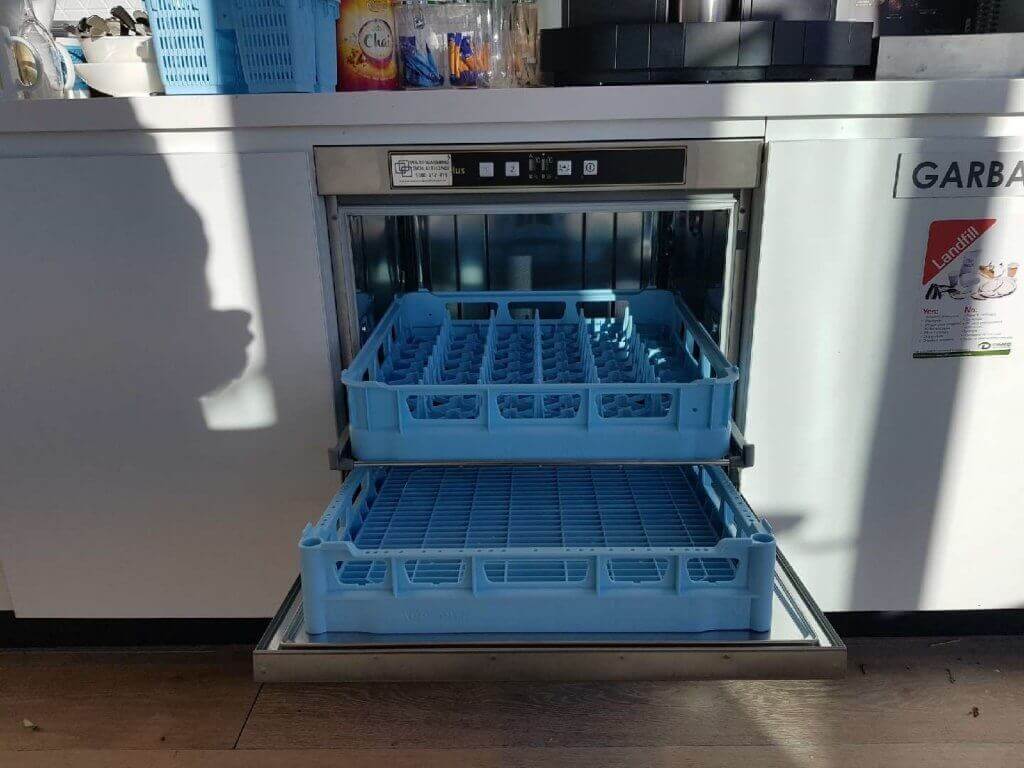
Hobart 503 into the Intuit Offices in Sydney
Entry-level undercounter dishwashers are capable of cleaning approximately 35 baskets worth of dishes per hour. Simply load up your dishes, set the wash cycle, and within minutes you’ll have a clean rack of plates. Most undercounter dishwashers come with racks designed to hold cutlery racks so you can wash more items in one cycle. For premises with single-phase electricity, undercounter dishwashers make sense since most of these machines can be powered by a standard 3-pin plug. However, 15 amp power is required.
As expected, these types of dishwashers are required to be plumbed into the main water supply. Do note that not every undercounter dishwasher comes with a drain pump. This means that a drain pump is required to be fitted if your waste outlet is above the positioning of the dishwasher.
Here is what you should consider before purchasing an undercounter dishwasher:
- What Are the cleaning demands for your business?
- Do you want to save space inside your kitchen?
- Does the positioning of the dishwasher allow for the unit to be plumbed into the main water supply?
Pass-through dishwashers
Large commercial businesses may require a heavy duty cleaning machine and that is where a pass-through dishwasher comes in. Pass-through dishwashers are the ideal choice for large-scale operations because of its ability to clean loads of dishes at once. The term pass-through comes from having to feed the dish rack from one side to the other where dirty and clean plates can be placed pre and post-wash
If you own a restaurant, chances are your kitchen is full of dirty plates. Some Pass-through commercial dishwashers can breeze through up to 80 racks of dishes per hour, ensuring that your plates are always available for serving. For food establishments that serve more than 230 meals a day, pass-through commercial dishwashers should be your main purchase. But before you go out and buy one, we recommend checking the electricity supply your premises to see if it’s a single or a three-phase.
Another thing to look out for is its size. Pass-through dishwashers sit tall and large and it’ll take up quite some space inside your kitchen. It’s best to check the measurements beforehand to see if your kitchen has enough room to accommodate the dishwasher. You may also need to check with your local council on ventilation system requirements – this will be required on most pass-through Dishwashers
Here is what you should consider before purchasing a pass-through dishwasher:
- Do you need to frequently wash plenty of dishes?
- Will the dishwasher fit inside your kitchen?
- Is the electricity supply within your premises stable?
Other factors to consider when buying a dishwasher
Aside from choosing between a pass-through and an undercounter dishwasher, there are a couple of factors to consider that may affect your buying decision. Here is what you should out for:
Energy efficiency
If you’re looking to cut down on operational costs, choose a dishwasher that will. Not only can it save you money, but it’s environmentally-friendly as well. Many dishwasher brands go above and beyond to ensure that their dishwashers are as efficient as possible. In a commercial kitchen where commercial dishwashers are heavily relied on, you’ll notice a huge difference in your electric bill when you opt for an energy efficient dishwasher.
SITE CONDITIONS
Location of the dishwasher within the flow of the kitchen layout is important, make sure services are not obstructed, as a pass-through needs both inlet and outlet areas.
Water supply temperature and water pressure are critical to correct operating performance.
Capacity
Perhaps one of the most important things to consider is the overall capacity of your dishwasher. If you’re running a large food business like a restaurant, you want to choose a dishwasher that has 12 to 16 place settings to accommodate plenty of dishes. This is achieved by using a smart arrangement of racks and tines that allow you to pack more dishes but still ensure a high-quality clean thanks to the advanced power of the nozzle and spray arms.
Features
Commercial dishwashers have come a long way since they were first invented and some high-end dishwashers come with advanced features like wireless connectivity and remote button locking to provide a more streamlined dishwashing experience. While some features are more of a luxury than a necessity, it’s still worth considering when buying a dishwasher since you’ll be using it every single day. The goal here is to make your dishwashing experience much more convenient and some dishwasher features do just that.
Conclusion
These tips will help you weigh your options when choosing between a pass-through dishwasher and an undercounter dishwasher. It all depends on your specific application and the nature of your business. If you have minimal cleaning demands, an undercounter dishwasher will suffice. But if you operate a large-scale food business, a heavy duty pass-through dishwasher will cover all of your cleaning needs.
The experienced team at Warewashing Solutions can work with you to assess which type of dishwasher would be most suitable for your site requirements

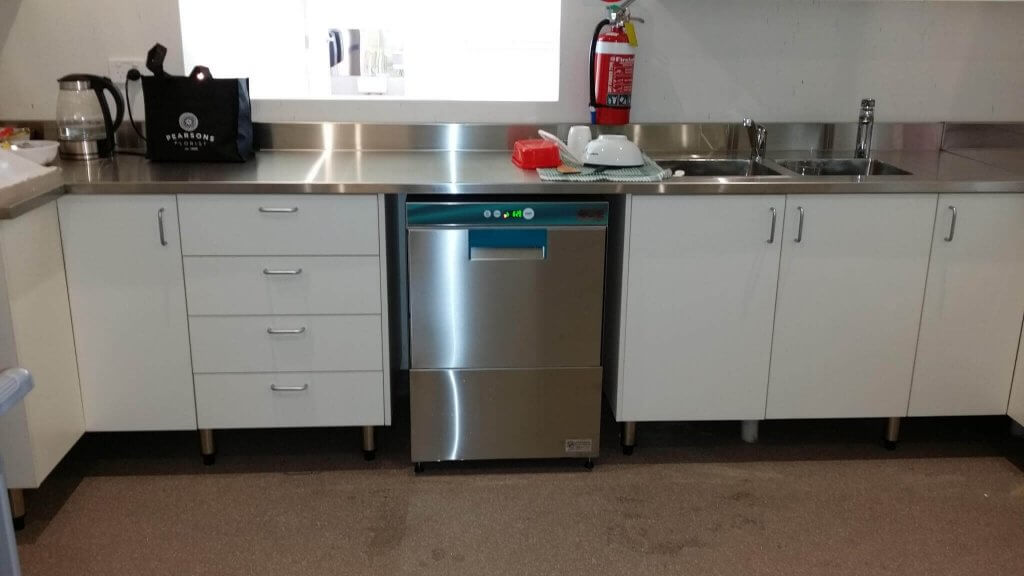
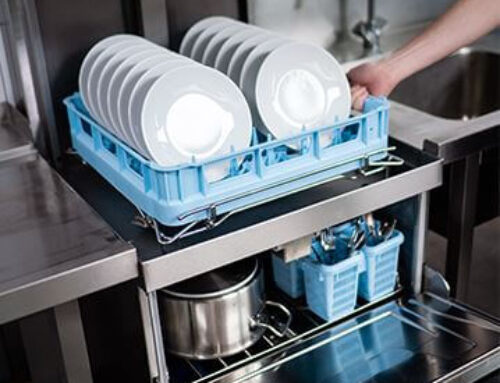
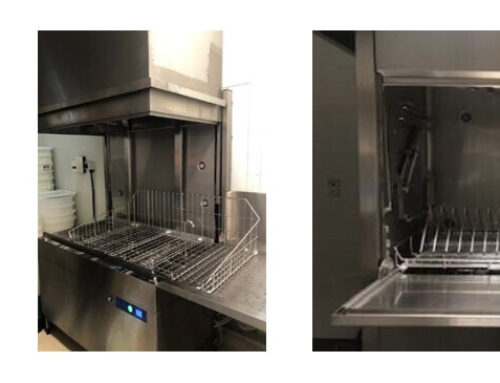
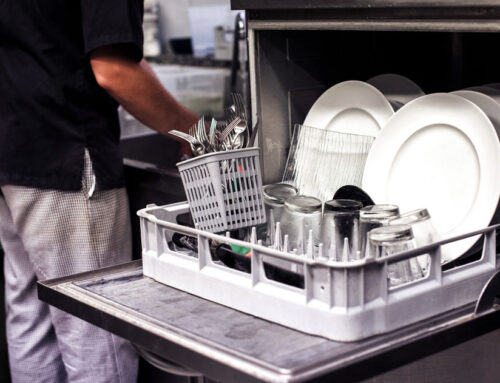
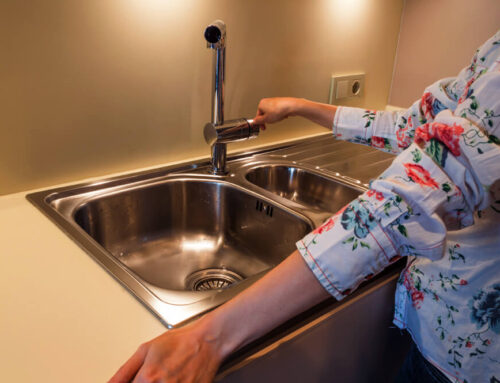
Leave A Comment